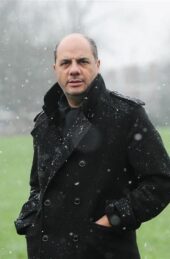What first attracted you to the period or periods you work in?
I write mostly about World War Two and immediately post war history. The attraction for me is that World War Two is generally speaking one of the only modern day conflicts in which survival of modern civilisation and democracy were at stake – so the stakes could not have been higher in any way. That makes it a ‘total war’ as Churchill famously named it – one the likes of which we’ve rarely seen before, or one hopes, will ever see again. There is the crucial bonus of course that there are still living veterans of WWII with us and they are keen to share their stories, and often so many do for the first time. Seeing their tales in print, finally being revealed to the outside world is such a special experience for those veterans – and so rewarding, of course, for the author.
Can you tell us a little more about how you research? Has the process changed over the years?
Not really. The research starts as always with the primary sources – reports, war diaries, letters, associated documents, photographs, audio tape or film from the time. With World War Two tales one is very lucky to have any of those last two – film or audio recordings, but the Imperial War Museum for example does hold some remarkable taped interviews with veterans. So well worth checking. And of course, a key starting point for any research is the World War Two veterans themselves, and their family members. So often there are private family collections – often, old war chests stored in the attic – that prove a treasure trove of research. Getting access to those is a really fabulous experience – unearthing untold and very nearly ‘lost’ history. Much of that primary research is held in the official archives, of course – so, for example, the National Archives, Kew, or the Imperial War Museum – but there are many, many more and the deeper one digs the more one tends to discover. Securing material from those archives has changed slightly, I guess, in that it generally is delivered in digital format, as opposed to photocopies – but I am old-fashioned I guess and always prefer to print out the documents, so I can hold and peruse them and scribble notes where required.
The common phrase is that history is written by the victors. Do you think this is true?
Yes. And no. Yes, when we’re talking history written in the years immediately following the events portrayed. No, when you’re talking about the passage of time. A historian like myself writing about World War Two has more perspective, hindsight, and the freedom to write the truth never mind the mores and sensitivities of the day. Equally importantly, so many files which were closed under secrecy laws are now being opened – 70 years or more after the events they portray – that more of the sensitive truth can be revealed. And in many cases even with those files still officially closed – so perhaps for 100 years after the events portrayed, for example – one can file a Freedom of Information request to get them opened early. I have filed many and never failed to get at least a redacted version of the contents released. Perusing a file no-one has seen for decades – ever since it was closed by the censors – is a great feeling. In fact, as a rule if I ever come across a file still closed I file a request for it to be opened. It would be wrong not to, in my opinion!
Are there any historians who helped shaped your career? Similarly, can you recommend three history books which budding historians should read?
Yes. I’d have to mention Erik Larson, simply because he is such a brilliant author of compelling narrative history and such a gifted writer and story-teller. Robert Harris also, because, while his books are billed as fiction, he does such a fantastic job of melding the real life events and characters from history with a fictional plot and I have no qualms about learning from and being inspired by such a gifted – fictional – story teller. And Andrew Roberts of course, who needs no introduction – a superlative historian and author. Their books I’d highly recommend, and especially Larsen’s WWII epic ‘The Splendid and the Vile’ – superlative – Harris’ newest ‘V2’ – gripping, brilliantly plotted – and Roberts’ splendid Churchill biography, ‘Walking With Destiny.’
If you could meet any figure from history, who would it be and why? Also, if you could witness any event throughout history, what would it be?
Churchill. Has to be. I’d love to ask him how exactly he stood firm in 1940-41, when all of Western Europe had fallen to the forces of Nazi Germany, when we – and our Allies – had suffered cataclysmic defeat on all fronts, when we had lost so much war material and brave soldiers at Dunkirk and long before America took the plunge and declared war on the Axis powers, and when so many in his political and military hierarchy were keen to cut a deal with Nazi Germany, and when even Hitler himself was amenable to such a deal, because he really wanted to start the push east – the assault on Russian, in the quest for lebensraum – rather than to invade Britain. The more one studies that time, and what Churchill was up against, the more incredible it is that he stood firm against all odds. As to events, Dunkirk – just because I am so utterly amazed that we managed to pluck such … if not victory, then at least survival, from the very jaws of defeat …
If you could give a piece of advice to your younger self, either as a student or when you first started out as a writer, what would it be?
Get experience first-hand of what you are writing about. So if you are a war historian I believe you do need to go and experience war in some shape or form. Of course, I worked as a war reporter for two decades, so have seen it and experienced it at first hand. That enables me to know and understand the experiences and emotions and feelings and thoughts of men and women in conflict in a way that is so very hard to do without having been there.
Can you tell us a little bit more about the project you are currently working on?
It’s the story of an incredible hero from World War Two – a man who soldiered in the desert of North Africa with irregular forces (most likely attached to the Long Range Desert Group, the forerunner of the SAS), before being captured by the enemy and sent to a POW camp in Italy. There he managed to break out, and realised that there were thousands of fellow Allied POWs across the Italian mountains, hiding out and facing starvation as winter 43/44 loomed, and so he decided to break into the Vatican, in Rome, to try to discover if the British delegation were still there and active and if they could set up a top-secret network to smuggle hundreds of POWs to safety. He’s a untold Schindler – a British war hero who broke into the Holy City, and became an undercover agent like no other, in the name of saving thousands of lives.






